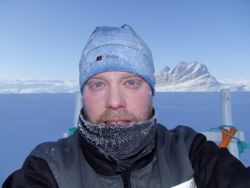Life in Greenland : Chris Paton’s interview - part 1
Ever wondered what it's like to live above the Arctic Circle? Read this interview for a glimpse of Greenlandic culture! Chris Paton is a 35-year-old English and Geography teacher who has been living in Uummannaq for 4 years. Uummannaq is a 12km2 island located about 650 kilometers north of the Arctic Circle in the northwest of Greenland.
Contacted by Chris Paton last spring, the IPF's educational team set up a collaborative framework so as to provide Educapole readers special insight into life above the Arctic Circle. A feature interview, published in two parts, will go over the various aspects of his life in Greenland. The first chapter goes into Chris Paton's background and introduces us to the Greenlandic community.
Why did you move to Greenland?
The idea of living in the North was very appealing to me. I was studying in Scotland then took a post-graduate teaching course in Denmark, where I met my wife. When I graduated, I applied for a job in Greenland. At the time, they were looking to hire over 400 qualified teachers in Greenland.
What is the Greenlandic lifestyle like?
Greenlandic culture is built on the natural environment. A lot of people depend on hunting activities for food; we have lots of whales around here. The narwhal, for example, is very important for Greenlanders: it is their preferred Christmas dinner meal. In settlements, hunting even becomes a necessity: if the head of the household doesn't go out and hunt, he won't bring any food home for his family.
When I lived in England I used to be against whaling but, now, I understand much better the relationship that lies between Greenlanders, wildlife and the animals. Living here has changed my perspective on this entirely. I don't criticize whaling anymore as long as it is for subsistence living. The majority of our hunters are professional whalers and, they too, are concerned about what happens. They only shoot what they will need to live from.
Another Greenlandic tradition is the "kaffemik". A 'kaffemik' is a social gathering which takes place around a cup of coffee. Although Greenlanders are particularly keen coffee-drinkers, it is not the coffee itself that is the purpose of this gathering. Rather, it is the chance to get together, exchange news and indulge in small-talk under the sun.
What impressed you the most upon arriving in Uummannaq?
The first thing I noticed was the overwhelming smell of fish. Fish is all over the place here, Uummannaq being is a fishing community. It sounds disgusting but you actually get use to it after a while.
Another big surprise was to see blood trails all over the island left by fishermen and hunters as they move their catch.
How was your integration into the Uummannaq community?
Uummannaq is a town of about 1.250 inhabitants. Qualified people are scarce. Lots of Europeans come out here to work, for the most part, for short periods of time. This is especially true with doctors and nurses, who stay between 2 weeks and 6 months. The first question Greenlanders therefore ask foreigners is "how long are you staying for"?
My wife Jane and I consider Uummannaq as our home. It was important for us to demonstrate, from the very beginning of our stay, that we were here for a long time period and to be a part of their culture. It sounds crazy but it actually took us a year to fully integrate the community. I think that's because Greenlanders are so used to seeing people come and go. The thing that helped me the most was that my students actually understood that I was interested in their life but that I wanted to bring them good schooling too.








